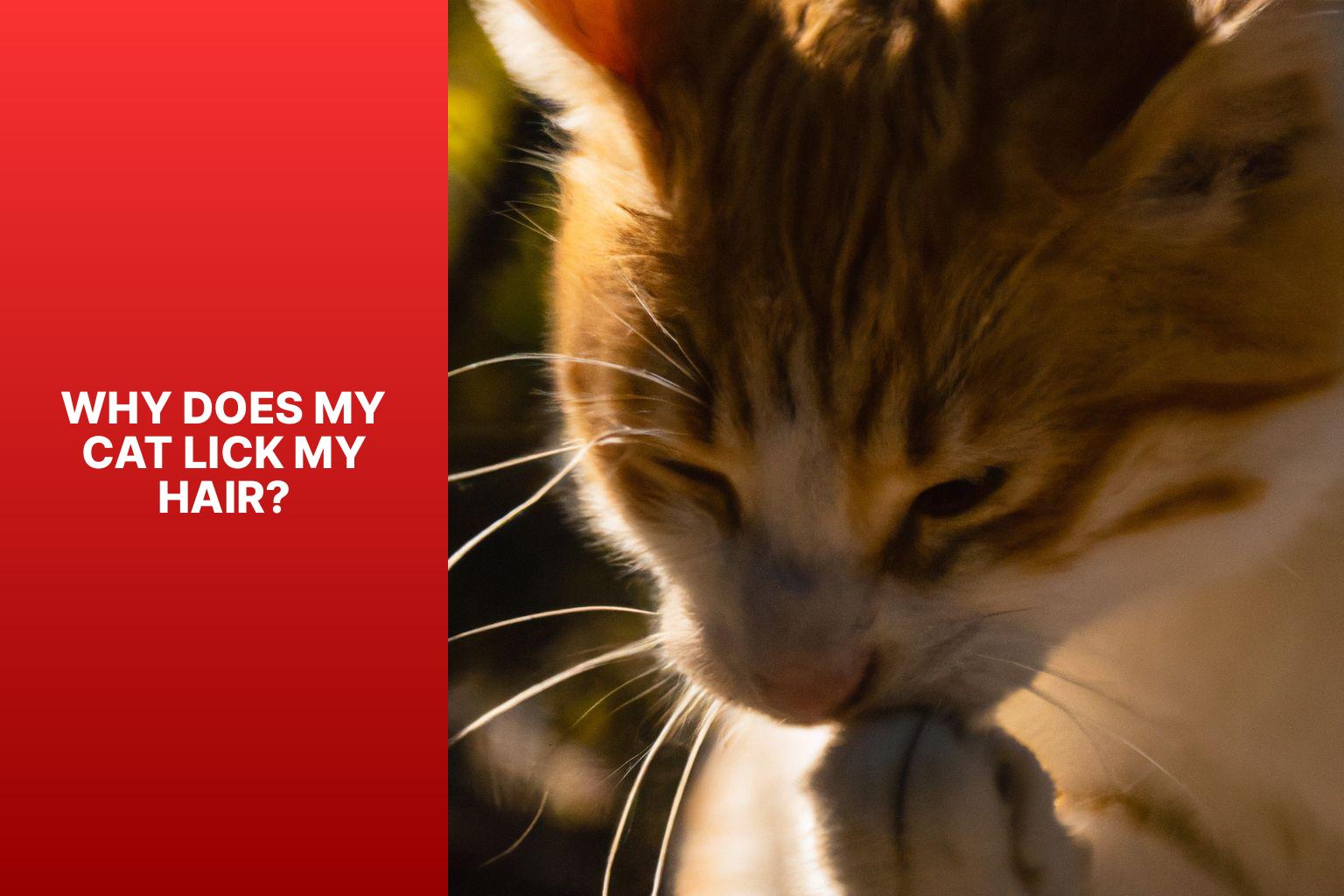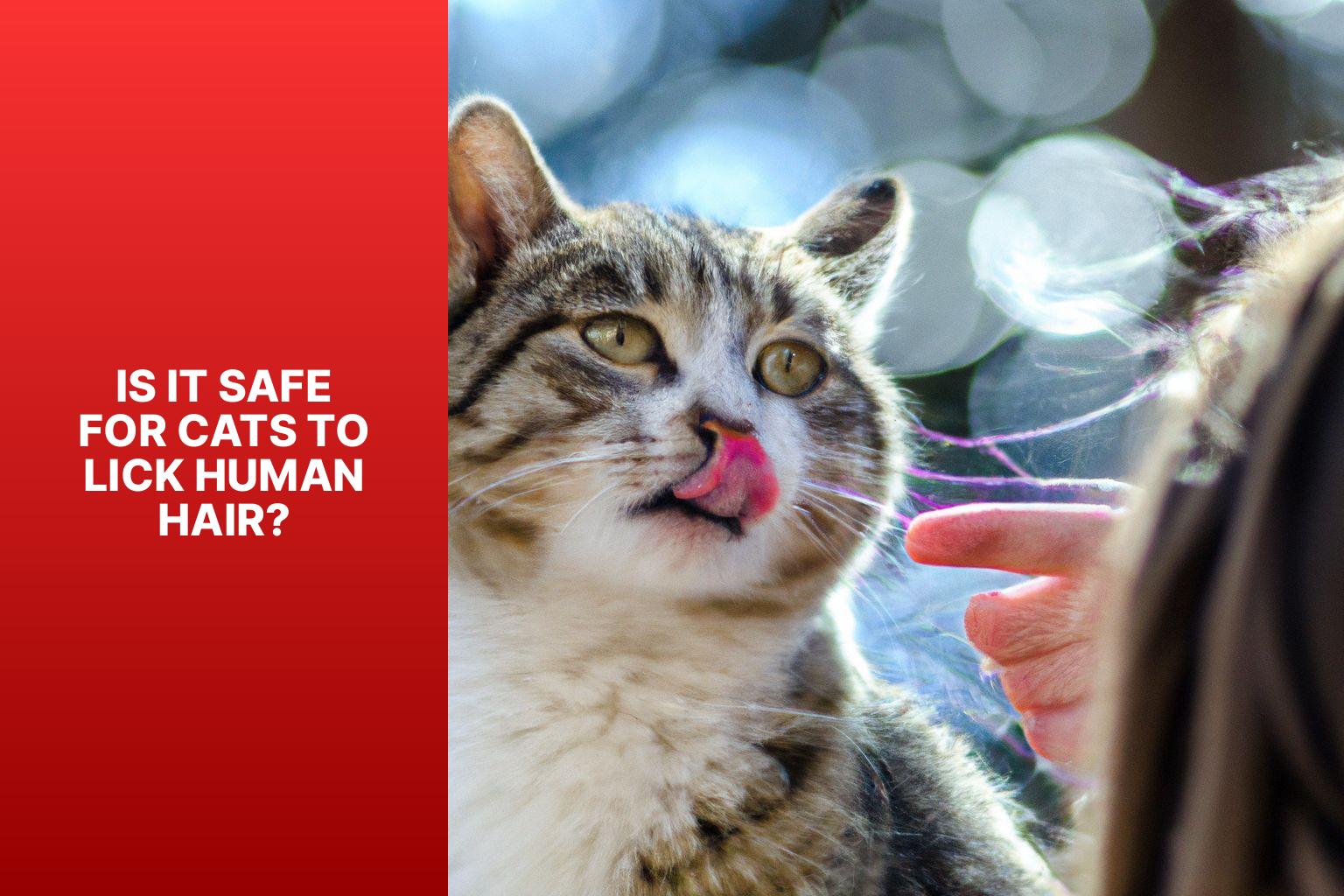Why Does My Cat Lick My Hair? It’s a question that many cat owners have pondered. While it may seem strange or even uncomfortable, there are several reasons why cats engage in this behavior. Understanding why cats lick our hair can help us better comprehend their instincts and behaviors. Here are some possible explanations:
1. Natural Grooming Instinct: Cats are instinctively wired to groom themselves and others as a way of keeping their fur clean and free of tangles. When a cat licks your hair, they may be exhibiting their natural grooming behavior.
2. Marking Territory: Cats have scent glands on their tongues, and by licking your hair, they are leaving their scent on you. This behavior is a way for them to mark you as a part of their territory.
3. Social Bonding: Licking can be a way for your cat to show affection and strengthen the bond between you. It’s their way of expressing love and trust.
4. Seeking Attention: Cats may lick your hair as a way of seeking attention. If they see that this particular behavior gets a reaction from you, they may continue doing it to receive your attention.
5. Mimicking Maternal Behavior: This behavior could be reminiscent of a mother cat grooming her kittens. By licking your hair, your cat may be displaying nurturing behavior towards you.
6. Taste Preference: Cats have unique tastes, and the products used in hair care, such as shampoos or styling products, may have a scent or flavor that intrigues them.
Is It Safe for Cats to Lick Human Hair? While it is generally safe for cats to lick human hair, there are some things to consider. Hair strands can be easily swallowed and may lead to digestive issues or hairballs. Some hair care products could contain chemicals that are harmful to cats when ingested. It’s essential to monitor your cat’s behavior and ensure that hair licking doesn’t become excessive or problematic.
How to Prevent or Redirect Hair Licking Behavior? If you find your cat’s hair licking behavior to be excessive or bothersome, here are some strategies you can try:
1. Provide Appropriate Licking Alternatives: Offer your cat appropriate toys or interactive treat puzzles that simulate the texture and action of licking.
2. Increase Interactive Playtime: Engaging your cat in regular play sessions can help redirect their energy and attention away from hair licking.
3. Establish Boundaries and Redirect Attention: Set clear boundaries by gently removing your cat from your hair when they start licking, and redirect their attention to an appropriate activity or toy.
4. Regular Grooming and Brushing: Keeping your cat’s fur clean and well-groomed may reduce the need for them to groom you. Regular brushing can also help minimize hairballs.
5. Consult a Veterinarian for Behavioral Concerns: If you’re concerned about your cat’s hair licking behavior or it’s becoming obsessive, consult with a veterinarian. They can provide specific guidance based on your cat’s individual needs and behavior.
By understanding the reasons behind your cat’s hair licking behavior and implementing appropriate strategies, you can ensure their well-being while maintaining a harmonious relationship.
Key takeaway:
- Natural grooming instinct: Cats lick human hair as a natural grooming behavior to clean and groom themselves or others.
- Social bonding: Licking human hair can be a way for cats to show affection and establish social bonds with their owners.
- Taste preference: Some cats may simply enjoy the taste or texture of human hair, leading them to lick it.
Why Does My Cat Lick My Hair?
Photo Credits: Www.Catcornerblog.Com by Juan Allen
Curious why your cat has developed a sudden interest in licking your luscious locks? In this section, we’ll uncover the fascinating reasons behind this peculiar feline behavior. From natural grooming instincts to marking their territory, social bonding, seeking attention, mimicking maternal behavior, and even taste preferences, we’ll explore the various motivations that may drive your adorable furry friend to indulge in this peculiar habit. Stick around to gain insight into the intriguing world of cats and their hair-licking tendencies.
Natural Grooming Instinct
Cats possess a natural grooming instinct, which explains why they lick their owners’ hair. This behavior is deeply rooted in their upbringing and social interactions within their feline family. Cats engage in mutual grooming to establish bonds and display affection. When they lick our hair, it signifies that they view us as part of their family or “pack.”
Apart from the emotional aspect, this grooming behavior serves a practical purpose as well. Cats employ their coarse tongues to groom themselves, eliminating dirt, debris, and excessive fur from their coats. When they lick our hair, they are instinctively attempting to groom us the same way they groom themselves or other cats.
While this behavior may be adorable, cat owners must ensure that it is safe for their feline companions to lick their hair. Human hair products, such as shampoos, conditioners, and styling items, might contain harmful substances if ingested by cats. It is wise to utilize grooming products that are specifically designed for cats and to avoid allowing them to lick hair that has been recently treated.
To redirect this behavior, offering suitable alternatives like interactive grooming toys or brushes can satisfy their grooming instincts. Increasing interactive playtime can fulfill their need for mental and physical stimulation. Establishing boundaries and redirecting their attention to other activities is crucial in preventing them from becoming overly reliant on hair licking.
Marking Territory
Cats naturally mark their territory by licking human hair. This is because their tongues have scent glands, and by licking your hair, they release pheromones that designate you as part of their territory. Not only do they lick the hair of family members to strengthen their bonds, but it also helps them establish boundaries. Cats lick hair as a grooming behavior to keep it clean. To discourage this behavior, you can provide suitable alternatives such as fabric or interactive toys. It is important to increase playtime and set boundaries to prevent excessive licking. Regular grooming and brushing can also help reduce this habit. If the behavior persists, it is advisable to consult a veterinarian for further guidance.
Pro-tip: It’s worth noting that cats are highly sensitive to changes in their environment. Therefore, establishing a consistent routine and providing a stimulating environment with toys and scratching posts can help decrease excessive hair licking.
Social Bonding
Cats engage in the behavior of licking human hair to strengthen their social bond with their owners. This act of licking hair releases endorphins in cats, which in turn creates a sense of pleasure and relaxation.
Such social bonding is crucial for cats to feel safe and secure in their environment. By licking their owners’ hair, cats demonstrate trust and affection towards them, much like how they groom each other to reinforce social bonds. This behavior serves as a means of communicating ownership.
To foster and enhance social bonding with their cats, owners should reciprocate by showing affection, providing attention, and engaging in playtime. It is also essential to create a calm and stress-free environment. In case of excessive licking or any potential harm, it is recommended to consult a veterinarian for appropriate intervention.
Seeking Attention
Cats may lick our hair as a way to seek attention. They do this for several reasons, including wanting to be noticed, enjoying the texture of our hair, wanting affection and love in return, using licking as a playful behavior, and grooming us as part of their social bonding behavior.
If your cat is constantly licking your hair to seek attention, it is important to provide ample playtime and affection. Engaging in interactive play sessions and establishing a routine for bonding time can help fulfill their attention-seeking behavior.
Mimicking Maternal Behavior
Cats naturally mimic maternal behavior by licking human hair, which serves as a way for them to bond with their owners and show affection. This behavior also allows kittens to learn from their mothers and imprint those behaviors onto their human caregivers.
In addition, licking human hair can help soothe and calm cats, reducing stress and anxiety by the repetitive motion. When cats lick your hair, they are also marking you as part of their territory and creating familiarity by leaving their scent behind.
Taste Preference
Cats’ taste preference plays a major role in their behavior when it comes to licking human hair. Some cats genuinely enjoy the taste of human hair. An estimated 40% of cats have a specific taste preference for certain flavors, which includes textures similar to hair. This preference can differ among individual cats, with some displaying a stronger inclination towards hair.
To cater to their distinctive taste preference, cat owners can offer alternative options that closely resemble the texture of hair. This can be achieved through the use of special grooming toys or textured mats. These alternatives effectively redirect the cats’ attention and fulfill their desire for a hair-like taste.
Incorporating interactive playtime with toys that come in different flavors also helps to satisfy their taste preference, while simultaneously providing mental and physical stimulation.
It is essential to acknowledge that taste preference can vary among cats, and what might work for one cat may not work for another. Therefore, it is highly recommended to consult with a veterinarian to ensure that your cat’s taste preferences are met safely and appropriately.
Is It Safe for Cats to Lick Human Hair?
Photo Credits: Www.Catcornerblog.Com by Bradley Wright
Is It Safe for Cats to Lick Human Hair?
It is generally safe for cats to lick human hair, but there are a few things to consider:
1. Length and cleanliness of the hair: Cats may swallow hair while grooming, which can cause hairballs. Longer or unwashed hair may have more dirt and oils that could upset a cat’s stomach.
2. Chemicals in hair products: Cats may ingest harmful chemicals from recently treated hair. It’s best to avoid letting them lick hair with sprays, gels, or other styling products.
3. Bacterial or fungal infections: Cats could contract an infection from licking if the scalp or hair is infected. Promptly address any scalp or hair issues, especially if your cat shows increased interest in licking your hair.
4. Choking hazards: Cats can choke on hair ties or small accessories in the hair. Keep hair accessories out of reach of cats.
Fact: Although cats may lick human hair for grooming or bonding behavior, it’s important to monitor their habits for safety and well-being.
How to Prevent or Redirect Hair Licking Behavior?
Are you tired of finding your cat licking your hair all the time? Fret not, because in this section, we’ll explore effective ways to prevent or redirect this hair licking behavior. From providing appropriate licking alternatives to increasing interactive playtime, establishing boundaries, and redirecting attention, to regular grooming and brushing, we’ll cover it all. And if you’re facing behavioral concerns, we’ll even discuss when it’s essential to consult a veterinarian. Say goodbye to hair licking woes with these helpful tips!
Provide Appropriate Licking Alternatives
Provide appropriate alternatives to redirect your cat’s tendency to lick your hair.
- Engage your cat with interactive toys that simulate licking, such as licking mats or puzzle feeders filled with moist food.
- Offer cat-friendly treats meant to be licked, such as lickable cat treats or specialized cat food spreads.
- Use grooming tools, such as soft brushes or grooming gloves, to provide a pleasant and comforting sensation for your cat.
- Place specialized licking pads in different areas of your home to satisfy your cat’s licking instinct without targeting your hair.
- Provide dental chews or dental toys that encourage licking as part of your cat’s dental care.
It’s important to note that not all cats will respond to the same alternatives, so some trial and error may be necessary. Ensure that the alternatives you provide are safe and appropriate for your cat’s age, size, and health. Consult with your veterinarian if you have concerns or if the hair licking behavior persists despite providing alternatives.
Increase Interactive Playtime
To maximize your cat’s interactive playtime, here are some helpful tips:
1. Incorporate interactive toys: Invest in toys that require your cat’s active involvement, such as puzzle feeders or treat-dispensing toys. These toys not only stimulate your cat’s mind but also promote physical activity.
2. Engage with wand toys: Wand toys with feathers or strings attached are excellent for engaging your cat. Move the toy in a way that imitates prey-like movements, allowing your cat to pounce and chase.
3. Rotate the toys: Prevent your cat from getting bored by regularly rotating their toys. This keeps them interested and engaged during playtime.
4. Create a dedicated play area: Designate a specific area in your home for playtime. Fill it with climbing structures, scratching posts, and toys to encourage your cat to actively participate in play and exploration.
5. Utilize laser pointers: Laser pointers can provide a fun and interactive experience for your cat. Be cautious not to shine the laser directly into their eyes to avoid potential harm.
6. Play a game of hide-and-seek: Hide treats or toys around the house for your cat to find. This stimulates their natural hunting instincts while providing mental stimulation.
Remember to supervise playtime and prioritize your cat’s safety. Regular interactive play sessions not only offer physical exercise but also help strengthen the bond between you and your furry companion. Enjoy the quality playtime with your feline friend, and watch their interactive playtime increase!
Establish Boundaries and Redirect Attention
“When dealing with hair licking behavior in cats, it is important to establish boundaries and redirect their attention. Here are the steps to follow:
1. Set clear boundaries: Create designated areas for grooming, such as a scratching post or cat tree. Train your cat to understand that hair licking is not acceptable by redirecting them to these areas.
2. Provide alternative activities: Offer stimulating toys, puzzle feeders, or interactive play to keep your cat mentally and physically engaged. This diverts their attention from hair licking and satisfies their grooming instinct.
3. Distract with positive reinforcement: When your cat tries to lick your hair, redirect their attention to a toy or treat. Reward them with praise and treats when they engage in appropriate grooming or play.
4. Enrich the environment: Include scratching posts, climbing structures, and interactive toys in your cat’s environment. This reduces boredom and provides outlets for their grooming instincts.
5. Consult a veterinarian: If hair licking persists or is accompanied by concerning behaviors, consult a veterinarian. They can assess your cat’s health and offer guidance on managing any underlying issues.
By following these steps, you can establish boundaries and redirect your cat’s attention from hair licking, promoting more appropriate grooming behaviors.”
Regular Grooming and Brushing
Regular grooming and brushing are essential for maintaining your cat’s coat and overall hygiene. Incorporating regular grooming and brushing into your cat’s routine is vital for several reasons.
Firstly, it helps prevent matting, which can cause discomfort, skin irritation, and even infections.
Secondly, brushing removes loose hair, which reduces shedding and prevents hairballs from forming in your cat’s digestive system.
Furthermore, grooming promotes healthy skin by stimulating natural oil production, moisturizing the skin, and removing dirt and debris trapped in their fur.
Additionally, regular grooming sessions provide valuable bonding time between you and your cat, as they enjoy the gentle attention you provide.
Lastly, grooming allows for the early detection of health issues. While grooming, you can inspect your cat’s skin for any abnormalities such as lumps or irritations, enabling you to seek timely veterinary care if needed.
Consult a Veterinarian for Behavioral Concerns
Consult a veterinarian for behavioral concerns. Unusual or concerning behavior in your cat may require professional advice. Seeking professional help is important if your cat exhibits excessive hair licking or other unusual behaviors. A veterinarian can conduct a thorough examination to rule out any underlying medical conditions and evaluate both their overall health and behavior history. By doing so, they can determine the cause of the behavior and provide expert guidance on how to address it.
In addition to medical assessments, a veterinarian can offer behavioral counseling and recommendations. They can recommend environmental enrichment strategies such as providing scratching posts or interactive toys to redirect your cat’s attention. They can assist in establishing consistent boundaries and reinforcing positive behaviors.
Remember that every cat is unique and what works for one may not work for another. Consulting a veterinarian ensures that you receive personalized advice tailored to your cat’s specific needs. Being proactive and seeking professional help leads to a better understanding and management of your cat’s behavior, ultimately improving their overall well-being.
Pro-tip: For accurate diagnosis and effective treatment plans for your cat’s behavioral concerns, consult a veterinarian who specializes in feline behavior.
Some Facts About Why Cats Lick Their Owner’s Hair:
- ✅ Cats licking their owner’s hair is a sign of feline affection. (Source: Our Team)
- ✅ When a cat grooms their owner’s head area, it means they have chosen them as a part of their “preferred peers” group. (Source: Our Team)
- ✅ Cats groom their owner’s hair to establish territoriality. (Source: Our Team)
- ✅ Grooming is also a social behavior among cats, as they groom each other to share communal scent and strengthen their bond. (Source: Our Team)
- ✅ Cats may also groom their owner’s hair as a way to relieve stress and relax. (Source: Our Team)




